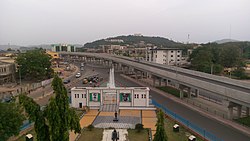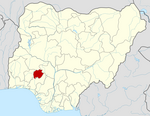world.wikisort.org - Nigeria
Ado Ekiti is the capital city of Ekiti State, Nigeria. It is the headquarter of the Ekiti central senatorial district, southwest, Nigeria.[2]
This article needs additional citations for verification. (November 2012) |
Ado Ekiti
Ado Ewi | |
|---|---|
 Ado Ekiti Fajuyi park | |
 Ado Ekiti Location in Nigeria | |
| Coordinates: 7°37′16″N 5°13′17″E | |
| Country | Nigeria |
| State | Ekiti State |
| Area | |
| • Total | 293 km2 (113 sq mi) |
| Elevation | 455 m (1,493 ft) |
| Population (2012) | |
| • Total | 424,340[1] |
| Climate | Aw |
Population and demographics
The population in 2006 was 308,621. The people of Ado Ekiti are mainly of the Ekiti sub-ethnic group of the Yoruba and Edo peoples.[3] Edo-Ekiti or Ado-Ekiti (the Yorubas typically referred to a person of Edo origin as Ado which is why the generals and princes/kings from Benin Empire in Yoruba lands are called Prince/Oba Ado) as it is now known is often categorized under the Yoruba ethnic group as a result of acculturation over the last few centuries.[3]
Education
Ado Ekiti City has a State owned University - the University of Ado Ekiti now Ekiti State University[4] Ado-Ekiti, a privately owned University - Afe Babalola University Ado-Ekiti,[5] a Polytechnic - the Federal Polytechnic, Ado-Ekiti,[6] Federal University Oye, (FUOYE), Oye-Ekiti,[7] privately owned polytechnic Crown polytechnic, Odo, Ado-Ekiti[8]
Media and economy
In Ado Ekiti, there are local television and radio stations such as Nigeria Television Authority Ado Ekiti, Ekiti State Television (BSES), and Radio Ekiti. Various commercial enterprises operate in Ado Ekiti. The city is the trade centre for a farming region where yams, cassava, grain, and tobacco are grown. Cotton is also grown for weaving.[citation needed]
Traditional leader
The current Ewi, or ruler, of Ado Ekiti is Rufus Aladesanmi III, who succeeded Samuel Adeyemi George-Adelabu I in 1990.
Gallery
- All saints church iyin ekiti
- Ayoba fm, Ado-ekiti
- Basic Health Centre, Erinfun, Ado-ekiti
- Central bank of Nigeria Ado ekiti
- Christus victor house ado ekiti
- Delight Suites and Hotel, Ado Ekiti
- Welcome to Ado Ekiti signpost
- The Cathedral Church of Emmanuel, Ado-ekiti
- The Anchor event center, Adi-ekiti, Ekiti state
References
- "World Gazetteer". Archived from the original on 2012-12-16.
- "Ado-Ekiti | Location, Facts, & History". Encyclopedia Britannica. Retrieved 2021-06-25.
- "Ado Ekiti | Hometown.ng™". 2016-11-24. Retrieved 2021-06-25.
- "Ekiti State University, Ado Ekiti Nigeria". campus.africa. Retrieved 2021-06-27.
- "Afe Babalola University partners Akin Fadeyi foundation to fight rape, cyberbully". 2020-09-19. Retrieved 2021-06-27.
- "Fed Poly Ado-Ekiti resumes Jan. 18 –Registrar - The Nation". Latest Nigeria News, Nigerian Newspapers, Politics. 2021-01-16. Retrieved 2021-06-27.
- "FUOYE Senate passes vote of confidence in VC | Premium Times Nigeria". 2021-06-17. Retrieved 2021-06-27.
- "CROWN POLYTECHNIC | Home :: CROWN POLYTECHNIC". crownpolytechnic.edu.ng. Retrieved 2021-06-27.
External links
На других языках
[de] Ado Ekiti
Ado Ekiti ist die Hauptstadt des nigerianischen Bundesstaates Ekiti und liegt im Südwesten von Nigeria. Einer Berechnung von 2012 zufolge hat die Stadt 409.270 Einwohner.[1] In der Agglomeration Ado Ekitis leben ca. 580.000 Einwohner.- [en] Ado Ekiti
[ru] Адо-Экити
А́до-Э́кити (Адо, англ. Ado Ekiti) — город на юго-западе Нигерии, столица штата Экити. Основное население — йоруба. Имеется университет, телевидение, радиостанция. Город — торговый центр для окружающего региона, где растут ямс, табак, хлопок, просо, маниок.Другой контент может иметь иную лицензию. Перед использованием материалов сайта WikiSort.org внимательно изучите правила лицензирования конкретных элементов наполнения сайта.
WikiSort.org - проект по пересортировке и дополнению контента Википедии














